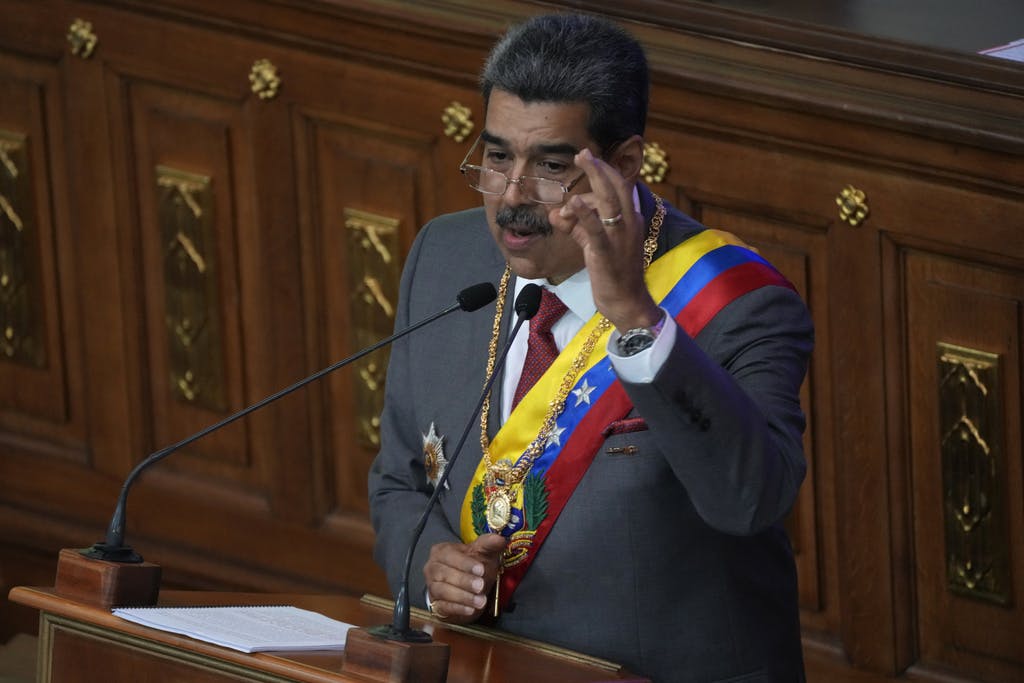Argentina’s Milei Stands Up to Venezeula’s Strongman, but Where’s Biden?
The Argentinian embassy at Caracas is surrounded by President Maduro’s enforcers, who are seeking to prosecute six opposition figures inside. So far, Milei is practically the hemisphere’s only leader to seriously push back against the Caracas regime.

Will America join President Milei of Argentina in siding with six activists who are under siege at Caracas? As Venezuela’s sham election nears, the Argentine populist is practically the hemisphere’s only leader to seriously push back against the Caracas strongman, President Maduro.
The Argentinian embassy at Caracas is surrounded by Mr. Maduro’s enforcers, who are seeking to prosecute the six opposition figures. They face frivolous and uncorroborated allegations of attempting to assassinate the president during a recent election campaign rally.
On Tuesday, Buenos Aires announced that the six are under its protection in the small extra-territorial embassy, and now Argentina and Venezuela are at a standoff.
“This is not going to be like Julian Assange,” a New York City-based Venezuelan-born journalist, Maibort Petit, tells the Sun. “I know that embassy very well. It’s a small building. Six people can’t stay there for long.” Especially, she adds, because Venezuelan security forces have surrounded the building and the regime has cut electricity and the water supply.
Like many wealthy Venezuelans who experience frequent cuts in life’s necessities, the embassy keeps a sizable reservoir of water at hand. Yet, the embassy has no access to its power generator, and water would also run out eventually.
Cutting power is a “deliberate action that endangers the safety of Argentine diplomatic personnel and Venezuelan citizens under protection,” Mr. Milei said in a statement Tuesday.
Accused of attempting to assassinate the president, the six Venezuelan citizens — Pedro Urruchrtu, Omar Gonzalez, Claudia Macero, Humberto Villalobos, Magalli Meda, and Fernando Martínez — were seeking refuge in foreign embassies for several days.
The vast American embassy compound at Caracas was not one of them. After activity there was suspended in 2019, only a skeleton caretaker staff was left behind, protected by heavy security and locked bars.
Only the tiny Argentinian embassy at Caracas opened its gates, and Mr. Milei announced that he would protect the six. Mr. Maduro immediately ordered a siege and demanded that Argentina extradite his regime’s opponents.
“I recently had dinner in Washington, D.C., with my friend, Pedro Urruchrtu, and I told him that Maduro would do whatever he needs to do to win this sham election,” Ms. Petit said. Her friend, though, was hopeful, saying that “someone in the U.S. would help,” she says. Now, Mr. Urruchrtu’s only hope is Mr. Milei.
Secretary-General Guterres of the United Nations believes that “human rights, including civil political rights must be protected — including the right to vote and to be elected,” his spokesman, Stephane Dujarric, tells the Sun. Last winter, he noted, an agreement was signed in Barbados for a free election in Venezuela.
Yet, UN statements, even if accompanied by a couple of bolivars, will hardly suffice to buy a Caracas cup of coffee, let alone a Venezuelan democracy. Under American pressure, Mr. Maduro agreed in Barbados that opposition leaders would participate in the election, which he announced would take place on July 28 — the birthday of his late mentor, Hugo Chavez.
Sure enough, soon after vowing to conduct a free and fair election, Mr. Maduro arrested his most formidable political opponent, Maria Corina Machado. A veteran regime opponent with long experience in public life, Ms. Machado then named as her replacement a college history professor who has never held public office, Corina Yoris.
All but guaranteed a new six-year term in office, Mr. Maduro nevertheless faces little, if any, serious pushback from others in the hemisphere, including America.
Last December, President Biden made a deal to release 10 Americans incarcerated in Venezuela. U.S. sanctions were eased, as Chevron and other companies won lucrative oil contracts in Venezuela. Other than minor new sanctions, Washington is hardly pressuring Caracas.
Mr. Milei, in contrast, has been feuding with Mr. Maduro ever since the Venezuelan strongman greeted his November election victory by telling television audiences that “the neo-Nazi extreme right won in Argentina.”
Caracas sources now say that the Brazilian ambassador to Venezuela is negotiating a compromise that could perhaps allow the six dissidents to leave for Argentina or another country.
Meanwhile, more than eight million Venezuelans have fled Mr. Maduro’s hard hand, the ruined economy, and the crime-ridden streets. These expats are unlikely to participate in the election, as they are required to give their names, addresses, and phone numbers to register to vote at the Venezuelan embassies in their current places of residence.
For obvious reasons, “I’m not going to give them such details,” Ms. Petit, who regularly exposes regime failures in her writings, says. Washington, she adds, is no longer seen by her compatriots as an ally that can help restore democracy in Venezuela.
Mr. Biden gave Mr. Maduro “all kinds of concessions and got nothing in return,” Ms. Petit says, adding that now “the United States is probably one of the most hated governments by the people of Venezuela.”

